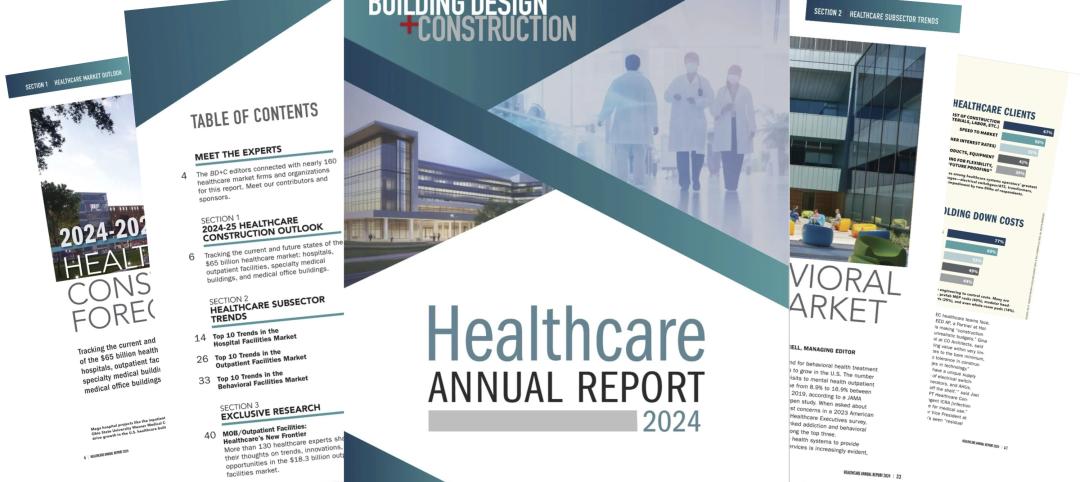International architecture, planning, engineering, interior design and program management firm LEO A DALY welcomes Stephen C. Wright, AIA, as the new managing principal of the Washington, D.C., office. He takes over the role from David N. Zelig, operations director, who has served as acting managing principal of the office for the past 10 months and who will continue on in his operations role.
Wright will oversee the D.C. team in executing federal, local government, private and non-profit projects and pursuing new business opportunities in markets including aviation, corporate and commercial, higher education, hospitality and institutional facilities. The office also serves as the headquarters for LEO A DALY’s international operations, with a focus on large-scale, mixed-use projects throughout China and Hong Kong.
“Steve’s impressive project portfolio, both in the D.C. region and beyond, speaks for itself in terms of the innovative designs he can provide for clients. We are honored to have his leadership to guide our local and international project teams and accelerate the momentum of the D.C. office,” says Charles Dalluge, LEO A DALY executive vice president. “His knowledge and experience in the higher education sector is a unique asset to our firm as we look to expand our client services in this area.”
Most recently, Wright was a principal of Perkins Eastman’s Washington, D.C., office, with a project portfolio including a new dining hall for the University of North Carolina at Charlotte, the academic master plan for Bowling Green State University, and a new home for the College of Health and Human Services at George Mason University. Prior to that role, he was a partner in his own firm from 1988 to 2010. In his career he has served as design principal for several award-winning student centers, libraries, performing arts, dining and academic projects at prestigious schools, including The College of William and Mary, Georgia Institute of Technology, James Madison University, Old Dominion University, Shanghai Conservatory of Music, Stanford University, University of Florida, University of Utah, Virginia Commonwealth University and Virginia Polytechnic Institute and Tech University.
Wright has received numerous awards for his design work and his commitment to the profession, including the 2008 Distinguished Achievement Award from the American Institute of Architects-Hampton Roads, Va. In 2011, his work received the Interior Design Award from the Virginia Society American Institute of Architects for the design of the Forbes Center for the Performing Arts at James Madison University.
A dedicated supporter of the arts, Wright is former chairman of the Norfolk Public Art Commission and past board member of the Virginia Chorale, the Virginia Symphony and the Virginia Tech Alumni Association. He is also past president of AIA Hampton Roads and is certified by the National Council of Architectural Registration Boards.
Wright received his bachelor of architecture degree from Virginia Polytechnic Institute and State University, Blacksburg, Va.
About LEO A DALY
Established in 1915, LEO A DALY is an international architecture, engineering, and interior design firm. The Company’s portfolio includes award-winning projects in 77 countries and all 50 states. With nearly 900 employees in 31 offices worldwide, the firm ranks in the top 10 largest design firms in the United States and top 25 globally. For more information, visit www.leoadaly.com.
LEO A DALY opened its Washington, D.C., location in 1964, focusing on projects in the aviation, commercial, cultural, federal, hospitality and institutional market sectors. The office also heads LEO A DALY’s international efforts.
Recent projects include:
- 999 Union Square, Washington, D.C.
- McPherson Building, Washington, D.C.
- Center for Leadership Excellence, Lockheed Martin Corporation, Bethesda, Md.
- Pope John Paul II Cultural Center, Washington, D.C.
- American Society of Clinical Oncology, Alexandria, Va.
- The J. Craig Venter Institute, Building 5, Rockville, Md.
- Shenzhen Excellence Century Center, Shenzhen, China
- TongDa International Center, Xiamen, China
- China Mobile International Information Port Phase II Plot B, Beijing, China
Related Stories
Codes and Standards | Jul 15, 2024
New York City code update changes definition of a major building
Changes affecting how construction projects in New York City are permitted will have significant impacts for contractors. On Dec. 11, the definition of a major building in the city’s code will change from 10 stories to seven, or 75 feet. The change will affect thousands more projects.
Adaptive Reuse | Jul 12, 2024
Detroit’s Michigan Central Station, centerpiece of innovation hub, opens
The recently opened Michigan Central Station in Detroit is the centerpiece of a 30-acre technology and cultural hub that will include development of urban transportation solutions. The six-year adaptive reuse project of the 640,000 sf historic station, created by the same architect as New York’s Grand Central Station, is the latest sign of a reinvigorating Detroit.
University Buildings | Jul 11, 2024
3 considerations for designing healthy, adaptable student dining
Amanda Vigneau, IIDA, NCDIQ, LEED ID+C, Director, Shepley Bulfinch, shares three ways student dining facilities have evolved to match changes in student life.
Healthcare Facilities | Jul 11, 2024
New download: BD+C's 2024 Healthcare Annual Report
Welcome to Building Design+Construction’s 2024 Healthcare Annual Report. This free 66-page special report is our first-ever “state of the state” update on the $65 billion healthcare construction sector.
Transit Facilities | Jul 10, 2024
Historic Fresno train depot to be renovated for California high speed rail station project
A long-shuttered rail station in Fresno, Calif., will be renovated to serve as the city’s high speed rail (HSR) station as part of the California High-Speed Rail Authority system, the nation’s first high speed rail project. California’s HSR system will eventually link more than 800 miles of rail, served by up to 24 stations.
Government Buildings | Jul 8, 2024
GSA adopts new accessibility guidelines for federal properties
The U.S. General Services Administration (GSA) adopted a new rule with new accessibility guidelines for federal buildings. The rule establishes that pedestrian facilities in the public right-of-way are readily accessible to and usable by people with disabilities.
Office Buildings | Jul 8, 2024
Office vacancy peak of 22% to 28% forecasted for 2026
The work from home trend will continue to put pressure on the office real estate market, with peak vacancy of between 22% and 28% in 2026, according to a forecast by Moody’s.
Virtual Reality | Jul 8, 2024
Can a VR-enabled AEC firm transform your project?
With the aid of virtual reality and three-dimensional visualization technologies, designers, consultants, and their clients can envision a place as though the project were in a later stage.
Green | Jul 8, 2024
Global green building alliance releases guide for $35 trillion investment to achieve net zero, meet global energy transition goals
The international alliance of UK-based Building Research Establishment (BRE), the Green Building Council of Australia (GBCA), the Singapore Green Building Council (SGBC), the U.S. Green Building Council (USGBC), and the Alliance HQE-GBC France developed the guide, Financing Transformation: A Guide to Green Building for Green Bonds and Green Loans, to strengthen global cooperation between the finance and real estate sectors.
Codes and Standards | Jul 8, 2024
New York State building code update would ban fossil fuels in new buildings
New York’s Building Code Council is set to include the All-Electric Buildings Act in its 2025 code update. The Act would ban natural gas and other fossil fuels in new buildings.

















